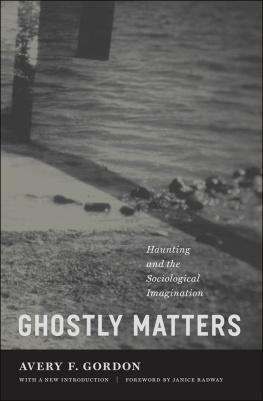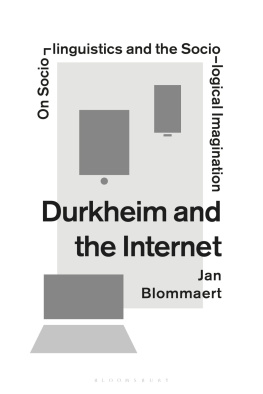Avery F. Gordon - Ghostly Matters: Haunting and the Sociological Imagination
Here you can read online Avery F. Gordon - Ghostly Matters: Haunting and the Sociological Imagination full text of the book (entire story) in english for free. Download pdf and epub, get meaning, cover and reviews about this ebook. year: 2008, publisher: University of Minnesota Press, genre: Politics. Description of the work, (preface) as well as reviews are available. Best literature library LitArk.com created for fans of good reading and offers a wide selection of genres:
Romance novel
Science fiction
Adventure
Detective
Science
History
Home and family
Prose
Art
Politics
Computer
Non-fiction
Religion
Business
Children
Humor
Choose a favorite category and find really read worthwhile books. Enjoy immersion in the world of imagination, feel the emotions of the characters or learn something new for yourself, make an fascinating discovery.
- Book:Ghostly Matters: Haunting and the Sociological Imagination
- Author:
- Publisher:University of Minnesota Press
- Genre:
- Year:2008
- Rating:4 / 5
- Favourites:Add to favourites
- Your mark:
- 80
- 1
- 2
- 3
- 4
- 5
Ghostly Matters: Haunting and the Sociological Imagination: summary, description and annotation
We offer to read an annotation, description, summary or preface (depends on what the author of the book "Ghostly Matters: Haunting and the Sociological Imagination" wrote himself). If you haven't found the necessary information about the book — write in the comments, we will try to find it.
Ghostly Matters: Haunting and the Sociological Imagination — read online for free the complete book (whole text) full work
Below is the text of the book, divided by pages. System saving the place of the last page read, allows you to conveniently read the book "Ghostly Matters: Haunting and the Sociological Imagination" online for free, without having to search again every time where you left off. Put a bookmark, and you can go to the page where you finished reading at any time.
Font size:
Interval:
Bookmark:
Praise for GHOSTLY MATTERS
Avery Gordons stunningly original and provocatively imaginative book explores the connections linking horror, history, and haunting.
George Lipsitz
Ghostly Matters immediately established Avery Gordon as a leader among her generation of social and cultural theorists in all fields. The sheer beauty of her language enhances an intellectual brilliance so daunting that some readers will mark the day they first read this book. One must go back many more years than most of us can remember to find a more important book.
Charles Lemert
One of the most courageous works of the last decade, Ghostly Matters is nothing less than an eloquent demonstration not only that modern knowledge practices are embedded in social forms of domination but that such practices work to conceal, rather than to disclose, the relationship between knowledge and power.
Lisa Lowe
What this review cannot capture is the eloquence of Gordons language, which at times approaches the poetic, and the insistence of her political engagement. The text is of great value to anyone working on issues pertaining to the fantastic and the uncanny.
American Studies International
Admirably, Ghostly Matters is itself a model of its subject matter, demonstrating with its many personal disclosures and considered reflections on others why the critical act is, in the last instance, a mournful one.
Quarterly Journal of Speech
GHOSTLY MATTERS
Haunting and the Sociological Imagination
Avery F. Gordon
With a New Introduction
Foreword by Janice Radway

Published with assistance from the Margaret S. Harding Memorial Endowment honoring the first director of the University of Minnesota Press.
Portions of were originally published in Social Problems 37, no. 4 (1990): 495-500; reprinted by permission of the University of California Press on behalf of the Society for the Study of Social Problems; copyright 1990 by the Society for the Study of Social Problems.
Permission to reproduce images in this book was granted by Jaimie Lyle Gordon for Time Honored Hands, Employees must wash hands, Guardian Angel, I went pioneering, Is there somewhere I should stand? Fighting the Horizon, If you were me, and I were you, and Migrant Mother; by the New-York Historical Society for Old Kentucky HomeLife in the South by Eastman Johnson; by the Cincinnati Art Museum for Fugitive Slaves on the Underground Railroad by Charles T. Webber; by the Henry Lillie Pierce Fund, Museum of Fine Arts, Boston, for Slave Ship (Slavers Throwing Overboard the Dead and Dying, Typhoon Coming On) by Joseph Mallord William Turner; and by Wilberforce House, Hull City Museums, Art Galleries and Archives, U.K., for the plan and cross section of the slaver Brookes of Liverpool.
New University of Minnesota Press edition, 2008
Copyright 1997 by the Regents of the University of Minnesota Foreword copyright 2008 by the Regents of the University of Minnesota Introduction to the New Edition copyright 2008 by Avery F. Gordon
All rights reserved. No part of this publication may be reproduced, stored in a retrieval system, or transmitted, in any form or by any means, electronic, mechanical, photocopying, recording, or otherwise, without the prior written permission of the publisher.
Published by the University of Minnesota Press
III Third Avenue South, Suite 290
Minneapolis, MN 55401-2520
http://www.upress.umn.edu
Library of Congress Cataloging-in-Publication Data
Gordon, Avery.
Ghostly matters : haunting and the sociological imagination / Avery F. Gordon, with a new introduction; foreword by Janice Radway. - New University of Minnesota Press ed.
p. cm.
Includes bibliographical references and index.
ISBN 978-0-8166-5446-8 (pb : alk. paper)
1. PostmodernismSocial aspects. 2. SociologyPhilosophy. 3. Marginality, Social. I. Title.
HM449.G67 2008
301dc22
2007049308
Printed in the United States of America on acid-free paper
The University of Minnesota is an equal-opportunity educator and employer.
15 14 13 12 11 10 09 08 10 9 8 7 6 5 4 3 2 1
Janice Radway
It must have been a challenge for Avery Gordon and her editors at the University of Minnesota Press to settle on a subtitle for Ghostly Matters. How do you encapsulate a book whose intellectually expansive introduction begins by claiming theoretical significance for the banal commonplace that life is complicated? In fact, Gordons claim is even more provocative. She asserts not merely that the proposition that life is complicated is perhaps the most important theoretical statement of our time (3) but that sociologists and social analysts specifically have failed to grasp the true significance of the claim. Her reader has to wonder immediately what dense particularities the abstraction complicated demarcates for Gordon and why those specificities have failed to figure in social analysis, which, she implies, is fatally weakened by simplification and generalization.
Explicating the meanings of complication, Gordon notes immediately that this folk theoretical statement has two dimensions. First, she observes, the power relations that characterize any historically embedded society are never as clear as the names we give to them imply (3). Abstractions like Racism and Capitalism, which are constitutive of virtually all sociological analysis, may name forms of power, but they do not fully convey the ensemble of social relations that create inequalities, situated interpretive codes, particular kinds of subjects and, most significantly for Gordon, the possible and the impossible themselves (4). To take the measure of the social ensemble in all its singular fullness, Gordon suggests, one needs to move analytically between that sad and sunken couch that sags in just that place where an unrememberable past and unimaginable future force us to sit day after day and those abstractions that name the structure of monumental social architecture[s] (4). Though she acknowledges the advantages of sociologys rhetoric of abstraction, Gordon is wary of the way such rhetoric renders unremarkable not merely the overdetermined densities and complexities of everyday life but, even more consequentially, the subjectively experienced limitations and constrictions as well as longings and desires that always animate it.
The theoretical claim that life is complicated has another dimension, therefore, in Gordons view. Even those who live in the direst circumstances possess a rich, contradictory subjectivity, something she calls complex personhood (4). She would have sociologists attend more carefully to this fact in their efforts to understand power and the way it is inflected by race, class, and gender dynamics. Complex personhood means that all people remember and forget; they are beset by contradiction; they recognize and misrecognize themselves and others; they get stuck in the symptoms of their troubles. Yet, they also transform themselves. Significantly, as well, they tell themselves stories about themselves and their societys problems that weave between what is immediately available as a story and what their imaginations are reaching toward (4). It is the particular density, delicacy, and propulsive force of the imagination that Avery Gordon wishes to see figured in sociological analysis, which she believes is limited by its restrictive commitment to an empiricist epistemology and its supporting ontology of the visible and the concrete. To make sense of what people do and whyas well as to understand what they might do differentlysociology cannot simply describe the vast and abstracted structures that both compel and inhibit social action. Rather, Gordon believes sociology must seek also to detect how conditions in the past banished certain individuals, things, or ideas, how circumstances rendered them marginal, excluded, or repressed. Sociology must preoccupy itself with what has been lost. According to Gordon, the lost is only apparently absent because the forced disappearance of aspects of the social continues to shadow all that remains. Because the past
Next pageFont size:
Interval:
Bookmark:
Similar books «Ghostly Matters: Haunting and the Sociological Imagination»
Look at similar books to Ghostly Matters: Haunting and the Sociological Imagination. We have selected literature similar in name and meaning in the hope of providing readers with more options to find new, interesting, not yet read works.
Discussion, reviews of the book Ghostly Matters: Haunting and the Sociological Imagination and just readers' own opinions. Leave your comments, write what you think about the work, its meaning or the main characters. Specify what exactly you liked and what you didn't like, and why you think so.









